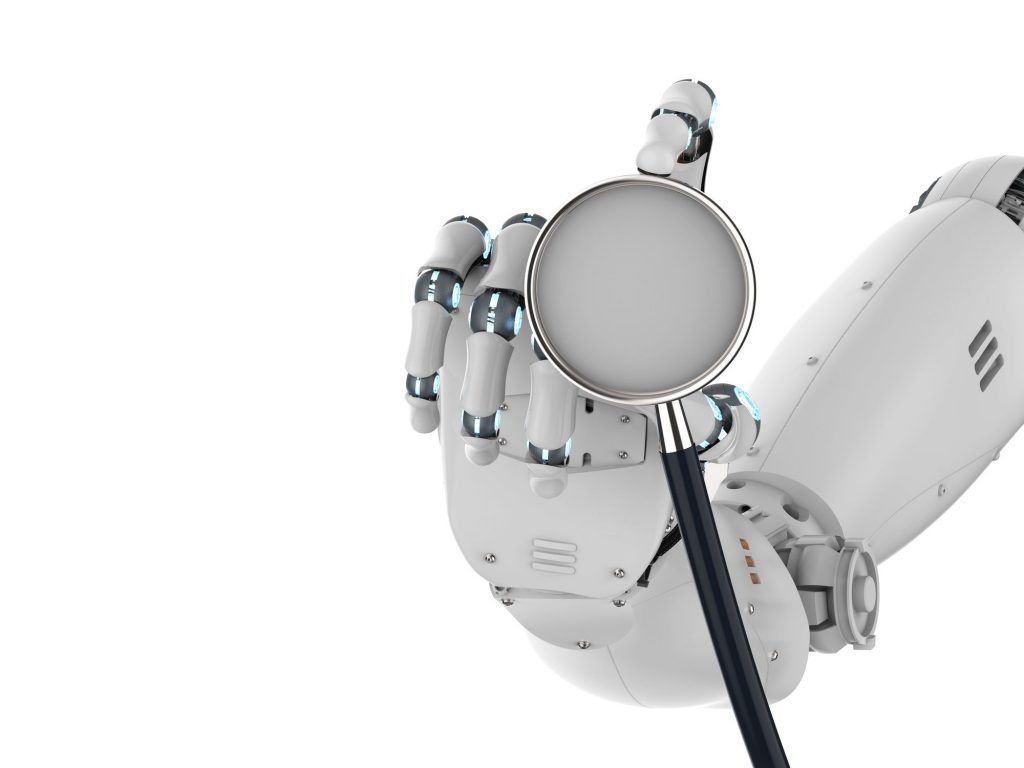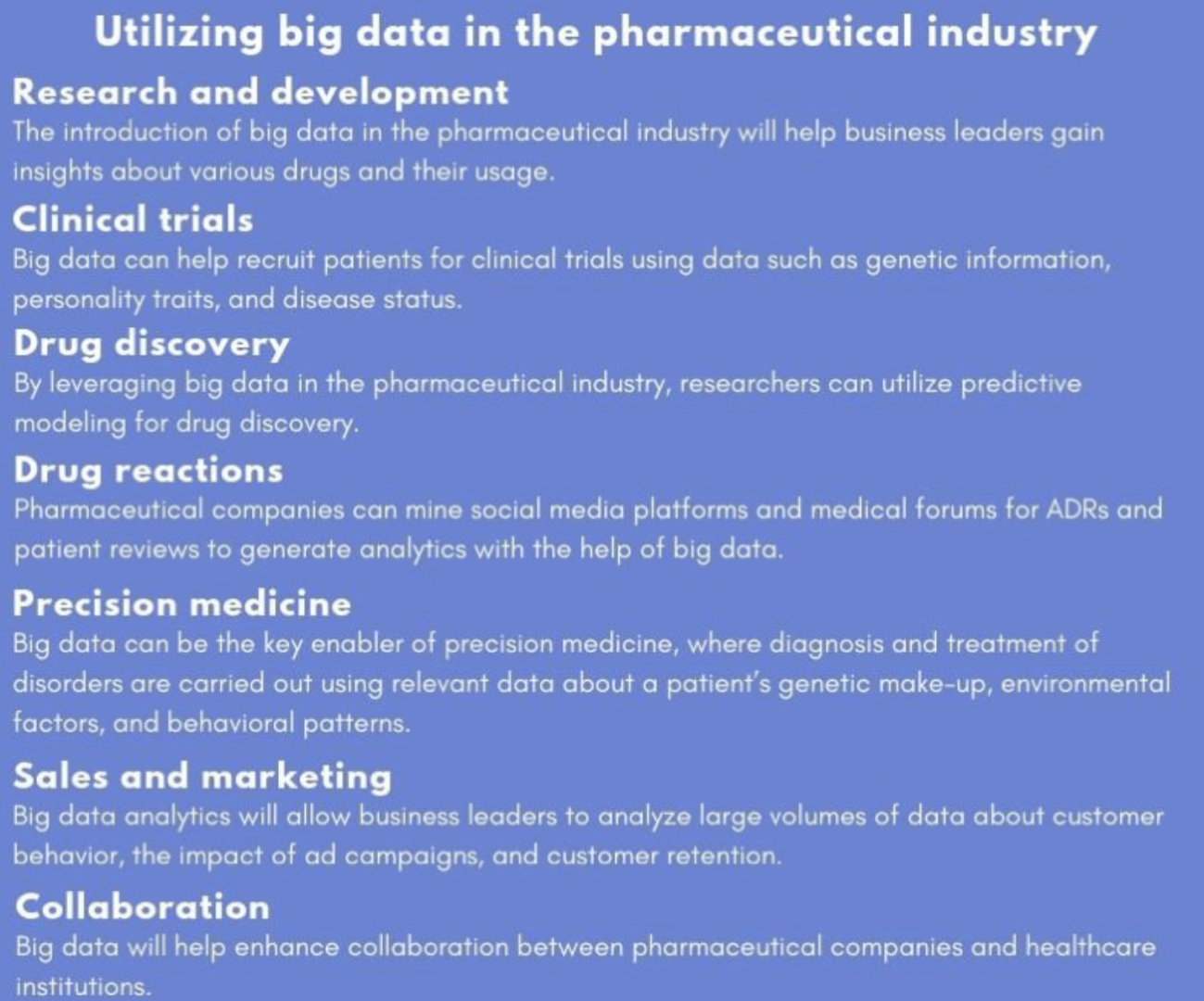Comments
- No comments found

Big data is revolutionizing the pharmaceutical industry by improving research & development, clinical trials, and drug discovery.
The utilization of big data has revolutionized industries such as telecommunications, advertisement, healthcare, and finance. Similarly, the pharmaceutical industry is also evolving with the increasing utilization of big data. The emergence of big data in the pharmaceutical industry is helping in streamlining multiple complicated business procedures and improving efficiency across the board. Hence, investors from healthcare and pharmaceutical industries have invested nearly $4.7 billion in big data. With continued investments, pharmaceutical businesses aim to develop several innovative applications.
Big data can enable businesses to gain insights from historical and real-time data sources such as social media, IoT sensors, log files, and patient data. Big data analytics can help in finding hidden patterns in such data that can be used to generate informative analytics. Leveraging big data, pharmaceutical companies can take a data-driven approach to several business procedures. Therefore, business leaders must stay informed about big data and its applications to benefit from the technology.
The use of big data in the pharmaceutical industry will give rise to the following applications:
Big data can prove to be beneficial for research and development in the pharmaceutical industry. Pharmaceutical companies can collect large volumes of data generated at the different stages of the value chain from drug discovery to real-world usage. For this purpose, pharmaceutical companies must identify suitable sources of clinical data and integrate this data into their big data infrastructure. With this approach, business leaders can link disparate datasets together to improve research and development procedures.
The introduction of big data in the pharmaceutical industry will help business leaders gain insights about various drugs and their usage. With the help of these insights, businesses can make informed decisions during research and development. Hence, pharmaceutical companies can develop more effective medicines and reduce their side effects using big data.
Clinical trials are used to test whether a specific treatment is effective and safe for human subjects. This procedure involves multiple stages before a final FDA review. The entire process of clinical trials is immensely complicated and riddled with major delays. Pharmaceutical companies lose millions of dollars worth of revenue due to these delays. Additionally, several clinical trials fail as recruiting patients for the trial is quite difficult. For recruitment, physicians have to manually review a list of eligible patients, which can be expensive and time-consuming.
Big data can help recruit patients using data such as genetic information, personality traits, and disease status. With this approach, physicians can understand various medical details of every patient and analyze whether a patient would be eligible for a clinical trial. Hence, pharmaceutical companies can perform shorter and less expensive clinical trials. Also, with the help of big data, physicians can use electronic medical records as their primary source of data for clinical trials, reducing data entry errors and speeding up medical procedures.
Traditionally, researchers implemented an iterative process of physically testing various plant and animal compounds to discover new drugs. Hence, drug discovery can require an immense amount of time and resources, which may be inconvenient for patients with disorders such as Ebola, swine flu, and typhoid, especially during epidemics. For instance, drugs needed for Amyotrophic Lateral Sclerosis (ALS) took years to be developed and approved. The cost of developing such drugs can also be increasingly expensive. Hence, pharmaceutical companies may invest in compounds that are most likely to be approved in clinical trials and have low production cost.
By leveraging big data in the pharmaceutical industry, researchers can utilize predictive modeling for drug discovery. Predictive modeling can enable researchers to predict drug interactions, toxicity, and inhibition. For this purpose, predictive models use advanced mathematical models and simulations that help in predicting how a particular compound will react with a human body. Predictive models can also use historical data collected from previous clinical studies, medical trials, and post-marketing surveillance. Together, all this data can help in predicting FDA approval and patient outcomes.
In some scenarios, medications may lead to harmful effects on a patient’s health known as adverse drug reactions (ADRs). ADRs can be a result of the inability to precisely replicate real-world scenarios during clinical trials. ADR reporting systems generally depend on regulatory reports released by lawyers, pharmacists, and clinicians. However, the information in ADR reports can be misinterpreted or lost. Therefore, several patients complain about ADRs or side effects on social networks such as Facebook and Twitter or online medical forums.
Pharmaceutical companies can mine social media platforms and medical forums for ADRs and patient reviews. For this purpose, pharmaceutical businesses can use sentiment analysis and natural language processing. The collected data can be analyzed with the help of big data analytics. With this approach, pharmaceutical companies can gather insights about adverse drug reactions. Hence, the process of reviewing drug reactions can be simplified by leveraging big data in the pharmaceutical industry.
Big data can be the key enabler of precision medicine, where diagnosis and treatment of disorders are carried out using relevant data about a patient’s genetic make-up, environmental factors, and behavioral patterns. With this approach, pharmaceutical companies can develop personalized medicines that are suitable for an individual patient’s genes and current lifestyle. Also, precision medicine can predict susceptibility to certain disorders and enhance disorder detection. With this approach, precision medicine has a higher probability of providing successful treatment compared to conventional medicines. Precision medicine may also save costs that occur in conventional medicines.
The utilization of big data in the pharmaceutical industry can enhance its sales and marketing efforts. With the help of big data, business leaders can analyze which geographical locations sell the highest number of promoted medicines. With such data, businesses may choose to supply more promoted products in those areas. Similarly, pharmaceutical companies can obtain critical data from various sources, helping them to make key decisions in their marketing and sales strategies.
The advent of big data in the pharmaceutical industry will allow business leaders to analyze large volumes of data about customer behavior, the impact of ad campaigns, and customer retention. Using such data and machine learning, businesses can perform predictive analytics to find patterns within the acquired data and make accurate predictions regarding industry trends. Using this approach, business leaders can be better prepared for upcoming industry trends.
Pharmaceutical companies can make treatments more effective with the help of big data. By leveraging laboratory data, pharmaceutical representatives can identify medicines that would be appropriate for certain patients. With this approach, they can advise physicians about certain medications and explain why those medications should be a part of a patient’s treatment.
Physicians can also collect patient data in real-time with the help of IoT in healthcare. With IoT-powered wearables, physicians can understand whether their therapy is working or not. In case a therapy fails, physicians can take suggestions from pharmaceutical companies based on patient data and available medications. In this manner, healthcare can become a collaborative and data-driven effort.
To reap the benefits of big data in the pharmaceutical industry, business leaders need to develop an effective adoption and implementation strategy. In this strategy, they must plan for necessary infrastructure, its integration with enterprise systems, the ever-increasing volume of collected data, and data security. Business leaders must address these challenges beforehand and develop a comprehensive approach to tackle them.
Naveen is the Founder and CEO of Allerin, a software solutions provider that delivers innovative and agile solutions that enable to automate, inspire and impress. He is a seasoned professional with more than 20 years of experience, with extensive experience in customizing open source products for cost optimizations of large scale IT deployment. He is currently working on Internet of Things solutions with Big Data Analytics. Naveen completed his programming qualifications in various Indian institutes.
Leave your comments
Post comment as a guest